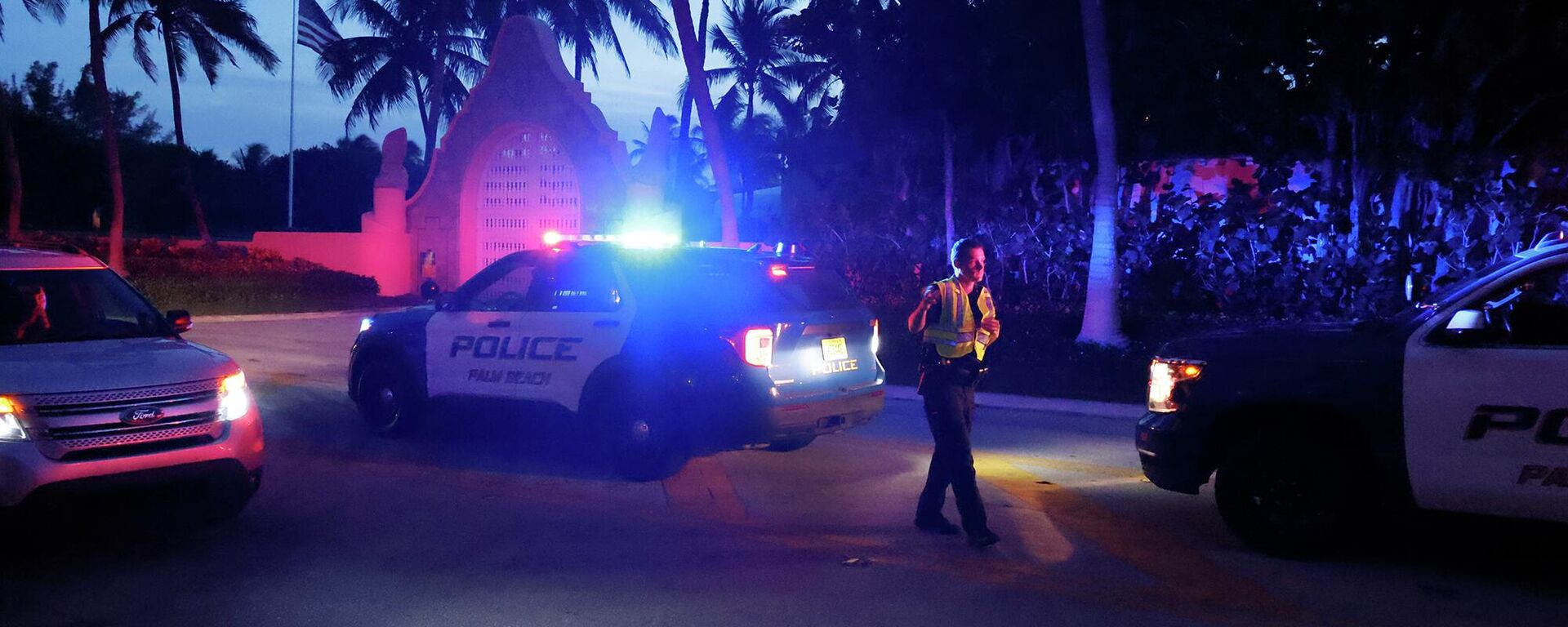https://sputnikglobe.com/20220814/client-attorney-privilege--earmarks-of-fishing-expedition-fbis-mar-a-lago-raid-triggers-questions-1099586240.html
Client-Attorney Privilege & Earmarks of Fishing Expedition: FBI's Mar-a-Lago Raid Triggers Questions
Client-Attorney Privilege & Earmarks of Fishing Expedition: FBI's Mar-a-Lago Raid Triggers Questions
Sputnik International
The FBI reportedly seized records covered by attorney-client privilege during its raid on former President Trump’s Mar-a-Lago home, Fox News reported on August... 14.08.2022, Sputnik International
2022-08-14T17:31+0000
2022-08-14T17:31+0000
2022-08-14T17:31+0000
us
donald trump
fbi
raid
mar-a-lago
house of commons select committee
attorney-client privilege
doj
https://cdn1.img.sputnikglobe.com/img/07e6/08/0c/1099521169_0:0:3079:1731_1920x0_80_0_0_f09afd8d428fa1574c2771b22d8cdd03.jpg
The FBI's Monday raid of Donald Trump's Mar-a-Lago home has prompted a lot of controversy, with the former president now demanding that the bureau return documents allegedly covered by attorney-client privilege and potentially executive privilege."By copy of this TRUTH," Trump wrote on August 13, "I respectfully request that these documents be immediately returned to the location from which they were taken. Thank you!"According to Fox News, boxes labeled A-14, A-26, A-43, A-13, A-33, and a set of documents, which were seen on the FBI’s property receipt, contained "attorney-client" and "executive" materials. Attorney-client privilege is a legal privilege that works to keep confidential communications between an attorney and his or her client secret. For its part, executive privilege gives the US president and other officials within the executive branch the authority to withhold certain forms of advice and consultation between the president and senior advisors.To sort the controversy out, Team Trump called upon Attorney General Merrick Garland to allow a third party to review the records in question. Still, sources told Fox News that the Department of Justice (DoJ) said that it would oppose the request.According to the media outlet, the agency conducted the search as it believes the former president could have violated several federal laws, namely: 18 USC 793 — Gathering, transmitting or losing defense information; 18 USC 2071 — Concealment, removal or mutilation; and 18 USC 1519 — Destruction, alteration or falsification of records in Federal investigations. In particular, 18 USC 793 is part of the Espionage Act and makes it a crime to remove or misuse information related to national defense.All in all, the FBI took approximately 20 boxes of items from Trump's home. The bureau's receipt claims that the agency seized classified and top secret records from Trump's Palm Beach premises. However, the ex-president insists that the documents in question have been declassified.Some American legal observers question the necessity of the FBI's August 8 raid. In particular, Jonathan Turley, Shapiro professor of public interest law at George Washington University, wondered if the bureau's sudden intrusion was really justified given that Trump's team had previously cooperated with the DoJ and complied with a federal subpoena.The professor further wonders what documents exactly the FBI was looking for and whether the bureau had identified the material to the Trump team and demanded its return from the former president prior to the raid. "It is hard to imagine the Trump Team telling the FBI to pound sand if such a demand was made," Turley remarked.He specifically drew attention to the FBI warrant's "sweeping language," which provided the bureau with the authority to take any boxes/containers found in close proximity to physical documents with classification markings.Turley cited critics who presumed that the FBI's unprecedented raid of Trump's premises has earmarks of a fishing expedition aimed at gathering evidence that could be used against the former president in a prosecution over his supposed role in the January 6 protests in DC. Previously, the House Select Committee on the January 6 Attack held a series of hearings with regard to Trump's alleged role in the Capitol breach, but has failed so far to establish a criminal case against the ex-president.Given the unfolding controversy, it would be reasonable to appoint a "special master" to review Trump's records, argued the lawyer. Turley added that it is similarly important to make public the "supporting FBI affidavit" which would reveal "what the FBI told the magistrate about the prior communications with the Trump team" before the Monday raid as well as "the specific allegations of the status of the documents in question."
https://sputnikglobe.com/20220812/why-us-conservatives-consider-fbi-raid-on-trumps-residence-undermined-democracy-1099517909.html
mar-a-lago
Sputnik International
feedback@sputniknews.com
+74956456601
MIA „Rossiya Segodnya“
2022
News
en_EN
Sputnik International
feedback@sputniknews.com
+74956456601
MIA „Rossiya Segodnya“
Sputnik International
feedback@sputniknews.com
+74956456601
MIA „Rossiya Segodnya“
us, donald trump, fbi, raid, mar-a-lago, house of commons select committee, attorney-client privilege, doj
us, donald trump, fbi, raid, mar-a-lago, house of commons select committee, attorney-client privilege, doj
Client-Attorney Privilege & Earmarks of Fishing Expedition: FBI's Mar-a-Lago Raid Triggers Questions
The FBI reportedly seized records covered by attorney-client privilege during its raid on former President Trump’s Mar-a-Lago home, Fox News reported on August 13, citing sources familiar with the investigation. Trump demanded via Truth Social on Sunday that the documents be returned.
The FBI's Monday raid of Donald Trump's Mar-a-Lago home has prompted a lot of controversy, with the former president now demanding that the bureau return documents allegedly covered by attorney-client privilege and potentially executive privilege.
"By copy of this TRUTH," Trump wrote on August 13, "I respectfully request that these documents be immediately returned to the location from which they were taken. Thank you!"
According to Fox News, boxes labeled A-14, A-26, A-43, A-13, A-33, and a set of documents, which were seen on the FBI’s property receipt, contained "attorney-client" and "executive" materials. Attorney-client privilege is a legal privilege that works to keep confidential communications between an attorney and his or her client secret. For its part, executive privilege gives the US president and other officials within the executive branch the authority to withhold certain forms of advice and consultation between the president and senior advisors.
To sort the controversy out, Team Trump called upon Attorney General Merrick Garland to allow a third party to review the records in question. Still, sources told Fox News that the Department of Justice (DoJ) said that it would oppose the request.

12 August 2022, 13:28 GMT
According to the media outlet, the agency conducted the search as it believes the former president could have violated several federal laws, namely: 18 USC 793 — Gathering, transmitting or losing defense information; 18 USC 2071 — Concealment, removal or mutilation; and 18 USC 1519 — Destruction, alteration or falsification of records in Federal investigations. In particular, 18 USC 793 is part of the Espionage Act and makes it a crime to remove or misuse information related to national defense.
All in all, the FBI took approximately 20 boxes of items from Trump's home. The bureau's receipt claims that the agency seized classified and top secret records from Trump's Palm Beach premises. However, the ex-president insists that the documents in question have been declassified.
Some American legal observers question the necessity of the FBI's August 8 raid. In particular, Jonathan Turley, Shapiro professor of public interest law at George Washington University, wondered if the bureau's sudden intrusion was really justified given that Trump's team had previously cooperated with the DoJ and complied with a federal subpoena.
"Moreover, even if a raid was necessary, it is not clear why the DoJ would descend upon Mar-a-Lago with such a massive show of force rather than send a few agents over with the warrant," Turley wrote in his blog.
The professor further wonders what documents exactly the FBI was looking for and whether the bureau had identified the material to the Trump team and demanded its return from the former president prior to the raid. "It is hard to imagine the Trump Team telling the FBI to pound sand if such a demand was made," Turley remarked.
He specifically drew attention to the FBI warrant's "sweeping language," which provided the bureau with the authority to take any boxes/containers found in close proximity to physical documents with classification markings.
"It is hard to see what material could not be gathered under this warrant," the lawyer elaborates. "It is not surprising that dozens of boxes were seized."
Turley
cited critics who presumed that the FBI's unprecedented raid of Trump's premises has earmarks of a fishing expedition aimed at gathering evidence that could be used against the former president in a prosecution over his supposed role in the January 6 protests in DC. Previously,
the House Select Committee on the January 6 Attack held a series of hearings with regard to Trump's alleged role in the Capitol breach, but has failed so far to
establish a criminal case against the ex-president.
Given the unfolding controversy, it would be reasonable to appoint a "special master" to review Trump's records, argued the lawyer. Turley added that it is similarly important to make public the "supporting FBI affidavit" which would reveal "what the FBI told the magistrate about the prior communications with the Trump team" before the Monday raid as well as "the specific allegations of the status of the documents in question."


